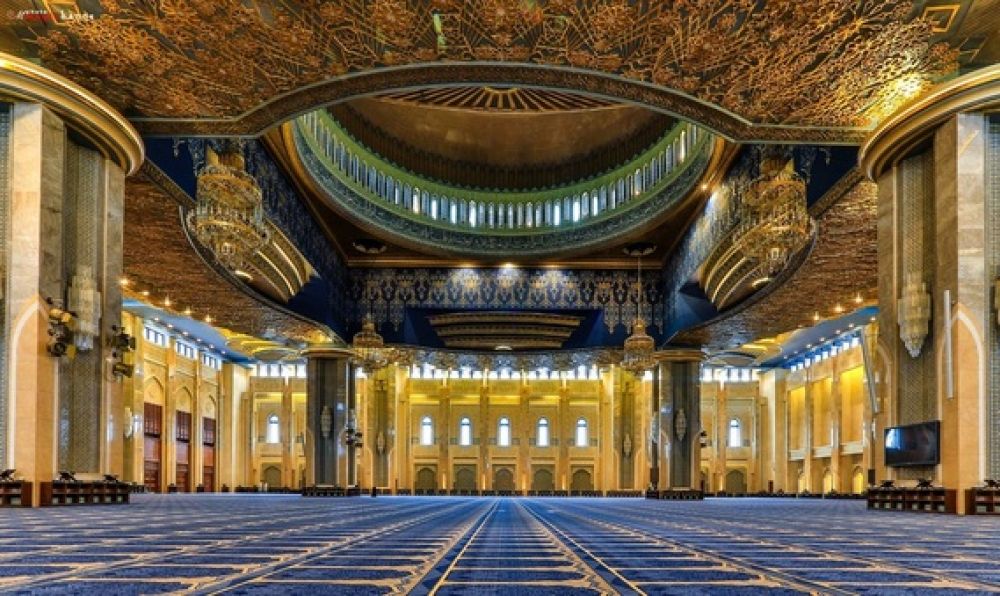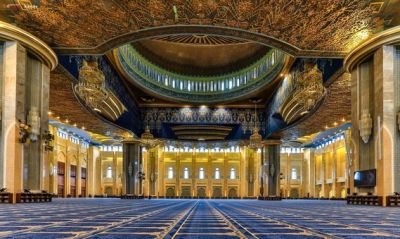

Experience the majestic grandeur of the Grand Mosque in Kuwait City with a guided tour of the main prayer hall. As the largest mosque in Kuwait, the Grand Mosque boasts an impressive architecture that is inspired by traditional Islamic design with a contemporary twist. During the tour, visitors will be able to observe firsthand the intricate Islamic calligraphy, geometric patterns, and lavish decorations that adorn the walls and ceilings. The tour guide provides an in-depth explanation of the mosque's architectural features, its significance to the local Muslim community, and the practices observed within its hallowed spaces. The expansive main hall is richly carpeted and can accommodate thousands of worshippers, reflecting the mosque's central role in Kuwait's religious life. With ample opportunity for peaceful reflection and photography, this experience is both educational and spiritually uplifting.
The Grand Mosque offers a Cultural Understanding Program designed to foster intercultural dialogue and provide insights into Islam and Muslim practices. This engaging program is a profound way for non-Muslim visitors to learn about the Islamic faith as well as local cultural traditions. Participants get the opportunity to ask questions and engage in discussions with knowledgeable hosts. The program may cover a variety of topics, including the Five Pillars of Islam, the importance of the mosque in the Muslim community, and the customs followed during daily prayers and special religious occasions. Visitors leave with a greater appreciation of the religious and cultural fabric that defines Kuwait and the broader Muslim world. This program also typically includes a brief introduction to Arabic language and etiquette, adding value to the immersive cultural experience.
The Grand Mosque's stunning architecture makes it a prime location for photographers keen on capturing the essence of Islamic art and design. Tour participants are guided through the mosque's various sections to take striking photographs of the detailed craftsmanship. The tour not only emphasizes the aesthetic aspects but also explains the historical significance and the stories behind different architectural elements. From the towering minarets and the vast courtyard to the intricate mosaics and grand dome, every corner presents a visual treat. Professional and amateur photographers alike will find the experience fulfilling, as the mosque's interior is bathed in natural light that changes throughout the day, offering a dynamic tableau for breathtaking images. Although the tour is focused on photography, it is open to anyone who appreciates art and culture.
Join the local community at the Grand Mosque for a serene sunset prayer experience. This activity allows visitors to witness the mosque coming to life during one of the most spiritual times of the day. As the sun sets and the call to prayer echoes across Kuwait City, the faithful gather to perform the 'Maghrib' prayer. Observers can watch or participate in the prayer rituals taking place in the spiritual atmosphere of the mosque. Following the prayers, visitors can interact with worshers and learn about the significance of the five daily prayers in Islam and the specific practices associated with the sunset prayer. The tranquility of the prayer, coupled with the stunning colors of the sunset, make this a memorable experience for those seeking to understand and respect local religious customs.
During the holy month of Ramadan, the Grand Mosque organizes communal Iftar gatherings that break the day's fast at sunset. Participating in an Iftar at the Grand Mosque is a unique way to experience the spirit of community and sharing that is central to Ramadan. Visitors will join worshers as they partake in dates and water, followed by a traditional meal that is often shared among attendees. The experience is not just about food; it's a chance to witness the generosity and hospitality that are hallmarks of Kuwaiti culture. Prior to the meal, one can observe the evening prayer that signals the end of the daily fast. The Grand Mosque's Ramadan Iftar is not only a cultural immersion but also a rare opportunity to see the principles of Islam in practice, emphasizing unity, charity, and piety.
The Islamic Calligraphy Workshop at the Grand Mosque is an enriching activity for those interested in the art of beautiful writing. Islamic calligraphy, which has a significant role in Muslim culture, is an art form that turns Arabic script into astonishing visual expressions. Participants in the workshop will be introduced to the basics of calligraphy, learn about different styles, and practice writing under the guidance of a skilled calligrapher. The workshop is suitable for all ages and skill levels, providing a supportive environment where one can create their own calligraphic masterpiece. It is both a creative and meditative experience, offering a deeper understanding of the cultural and spiritual importance of calligraphy in Islamic art and architecture.
Experiencing a Friday sermon (Jumu'ah) at the Grand Mosque is an opportunity to observe an important weekly event for the Muslim community. The sermon is a spiritual and communal gathering that occurs every Friday, replacing the regular midday prayer. It consists of a sermon (delivered by the Imam) that offers religious guidance, teachings from the Quran, and communal prayers. While the main hall is usually reserved for Muslim participants during the prayer, there is often a designated area for visitors to respectfully observe the proceedings. The experience allows one to gain insight into the communal aspect of Islam and the importance of the Friday sermon for imparting moral values and fostering a sense of unity among worshippers.
The Grand Mosque offers educational programs aimed at children to teach them about Islamic traditions, culture, and the significance of the mosque in a fun and interactive environment. These programs often include storytelling, games, and workshops that are tailored to engage the curiosity and imagination of the younger visitors. The objective is to provide an informative and respectful understanding of the mosque and Islamic practices, while ensuring the content is accessible and enjoyable for children. Whether it's through art, literature, or interactive exhibits, the children's educational programs at the Grand Mosque are designed to inspire learning and create a memorable experience that fosters respect and appreciation for cultural diversity from an early age.
The Grand Mosque's evening lectures are a series of informative sessions that cover various aspects of Islamic faith, history, and culture. These lectures are typically given by scholars, religious leaders, or cultural experts and offer in-depth analysis and discussion on topical issues or significant Islamic sciences such as jurisprudence, theology, or philosophy. The series aims to educate attendees, stimulate intellectual discourse, and provide a platform for exchanging ideas. Lectures are usually open to both Muslims and non-Muslims, reflecting the mosque's commitment to educational outreach and fostering understanding across diverse audiences. Attendees can expect to deepen their knowledge and gain fresh perspectives on Islamic thought and its application in the contemporary world.
In the serene ambience of the Grand Mosque, visitors can partake in or listen to recitation sessions of the Holy Quran. These sessions feature reciters with a mastery of 'tajweed' – the art of reciting the Quran with proper pronunciation and intonation. The melodic and rhythmic recitation of the Quranic verses offers a deeply spiritual experience that can be appreciated by Muslims and non-Muslims alike. The recitation sessions promote meditation, spiritual reflection, and an appreciation for the beauty and complexity of the Arabic language. Such sessions are held regularly and provide a peaceful respite from the bustle of daily life, enabling attendees to immerse themselves in the spirituality that is central to the mosque's purpose.
